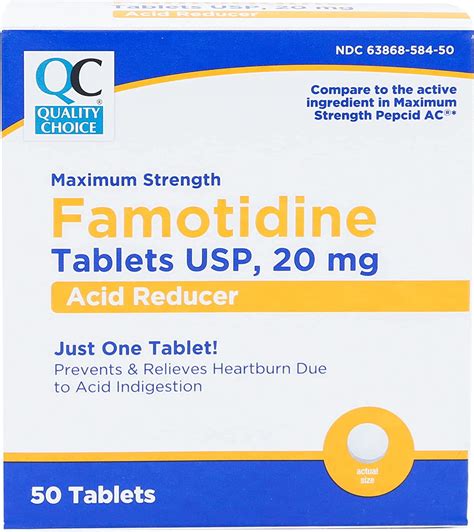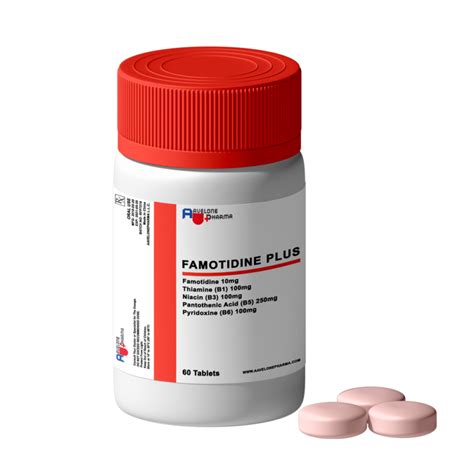Intro
Discover the uses, benefits, and side effects of Famotidine 20mg Tablets, a medication for treating heartburn and acid reflux. Learn how this histamine-2 (H2) blocker works, its dosage instructions, and potential interactions with other medications. Get the facts on this over-the-counter (OTC) acid reducer and find relief from gastroesophageal reflux disease (GERD) symptoms.
Famotidine is a medication that has been widely used for decades to treat various gastrointestinal disorders. Its effectiveness in reducing stomach acid production has made it a staple in the treatment of conditions such as gastroesophageal reflux disease (GERD), peptic ulcers, and Zollinger-Ellison syndrome. In this article, we will delve into the world of famotidine 20mg tablets, exploring their benefits, working mechanisms, and potential side effects.

What is Famotidine?
Famotidine is a histamine-2 (H2) blocker, a class of medications that reduce the amount of acid produced by the stomach. It works by blocking the action of histamine, a chemical that stimulates the stomach to produce acid. By reducing stomach acid production, famotidine helps to alleviate symptoms such as heartburn, regurgitation, and stomach pain.
How Does Famotidine Work?
Famotidine works by binding to H2 receptors in the stomach, preventing histamine from stimulating acid production. This leads to a decrease in the amount of acid produced by the stomach, which in turn helps to reduce symptoms of acid reflux and other gastrointestinal disorders.
Benefits of Famotidine 20mg Tablets
Famotidine 20mg tablets offer several benefits, including:
- Quick relief from heartburn and acid reflux symptoms
- Effective treatment for peptic ulcers and Zollinger-Ellison syndrome
- Available over-the-counter (OTC) and by prescription
- Can be taken orally, making it easy to administer
- Generally well-tolerated, with few side effects

Common Uses of Famotidine 20mg Tablets
Famotidine 20mg tablets are commonly used to treat:
- Gastroesophageal reflux disease (GERD)
- Peptic ulcers
- Zollinger-Ellison syndrome
- Heartburn and acid reflux
- Stomach pain and discomfort
Dosage and Administration
The recommended dosage of famotidine 20mg tablets varies depending on the condition being treated. For GERD and peptic ulcers, the typical dosage is 20mg twice daily. For Zollinger-Ellison syndrome, the dosage may be higher, typically 40mg twice daily.
Potential Side Effects of Famotidine 20mg Tablets
While generally well-tolerated, famotidine 20mg tablets can cause side effects, including:
- Headache
- Dizziness
- Fatigue
- Diarrhea
- Constipation

Interactions with Other Medications
Famotidine 20mg tablets can interact with other medications, including:
- Antacids
- Sucralfate
- Ketoconazole
- Itraconazole
- Warfarin
Precautions and Contraindications
Famotidine 20mg tablets are contraindicated in patients with a known hypersensitivity to famotidine or other H2 blockers. Caution should be exercised when administering famotidine to patients with kidney disease, as it may increase the risk of kidney stones.
FAQs
Can I take famotidine 20mg tablets with other medications?
+It is best to consult with your doctor or pharmacist before taking famotidine 20mg tablets with other medications.
How long does it take for famotidine 20mg tablets to work?
+Famotidine 20mg tablets typically start working within 1-2 hours after administration.
Can I take famotidine 20mg tablets if I am pregnant or breastfeeding?
+It is recommended to consult with your doctor before taking famotidine 20mg tablets if you are pregnant or breastfeeding.
In conclusion, famotidine 20mg tablets are an effective and well-tolerated treatment option for various gastrointestinal disorders. By understanding the benefits, working mechanisms, and potential side effects of famotidine, you can make informed decisions about your treatment options. If you have any questions or concerns, be sure to consult with your doctor or pharmacist.
We encourage you to share your thoughts and experiences with famotidine 20mg tablets in the comments below. Have you used famotidine to treat a gastrointestinal disorder? What were your results? Share your story with us!
